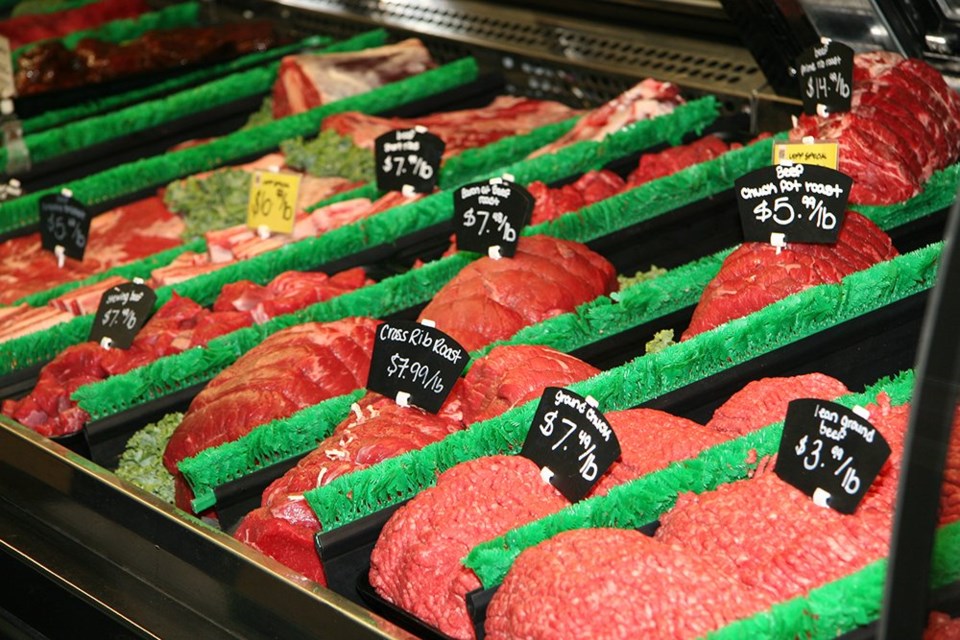WESTERN PRODUCER — Beef and pork producers are relieved after Health Canada backed down from a plan to label ground meat with a fat content warning.
Federal minister Jean-Yves Duclos announced new front-of-package nutrition labels June 30 for products that are high in saturated fat, sugar or sodium content. Companies have until Jan. 1, 2026 to have the labels in place.
Raw, single ingredient whole meats, poultry and fish, and foods sold at farmers markets were granted technical exemptions, as were ground beef and pork.
Initially the latter were to be labelled, causing the industry and opposition politicians to campaign against the plan. They pointed out ground meats are still single ingredient foods that consumers like and can afford.
Francis Drouin, parliamentary secretary to agriculture minister Marie-Claude Bibeau, said the government heard the industry and adjusted the regulations.
“Requiring a symbol on ground meats and poultry and not on whole cuts of meat may lead people in Canada to erroneously believe that all whole cuts are healthier than ground,” said a government backgrounder accompanying the announcement. “In certain cases, these exemptions will be lost, such as if a claim is made, or if anything is added to the meat like salt, saturated fat or even spices.”
A joint news release issued by the Canadian Cattlemen’s Association, the Canadian Pork Council, the Canadian Meat Council and the National Cattle Feeders’ Association said they were happy the government listened.
About half of the beef eaten in Canada is ground, and more than 90 percent of Canadians eat ground beef weekly, the CCA said.
“We are pleased with Health Canada’s decision to omit ground beef from requiring a misleading warning label,” said CCA president Reg Schellenberg.
CMC chief executive officer Chris White said the exemption would ensure meat exports can continue without additional challenges. Some had flagged the labels as a potential trade issue.
“We’re pleased Health Canada is exempting ground pork along with other nutritious foods such as milk, eggs, vegetables and fruit from a front-of-package label,” added CPC chair Rick Bergmann. “Ground pork is a convenient, whole food that contributes essential nutrients many Canadians need more of in their diets.”
The nutrition symbol will include a magnifying glass to draw attention and complement the nutrition facts table already on packages.
Duclos said front-of-package nutrition labels will reduce diseases such as heart disease and type 2 diabetes, which two in five Canadians report having.
Foods that will require the front-of-package labels include prepackaged foods that meet or exceed certain levels of saturated fat, sugar or sodium. The requirement thresholds will correspond to a percentage of the daily value per reference amount or serving size, whichever is greater.
The front-of-package labels will be found on: general prepackaged foods that meet or exceed 15 percent of daily value, such as deli meats, soups, frozen desserts or puddings; prepackaged foods with a small reference amount, about 30 grams or millilitres, that meet or exceed 10 percent of daily value, such as pickles, salad dressing, cookies or breakfast cereals; and prepackaged main dishes with a reference amount of about 200 grams that meet or exceed 30 percent of daily value, including frozen lasagna, meat pies or pizza. Main dishes intended for children aged one to four have a 170-gram threshold.
In addition to the meat technical exemptions, there are exemptions for milk, eggs, vegetables, fruits and foods with a healthy fat profile, including vegetable oils, nuts and fatty fish. However, these foods lose their exemptions when combined with other ingredients that contain fat, sugar or sodium.
Many cheeses and yogurts will be exempt because they are considered sources of “shortfall nutrients” such as calcium or those that aren’t readily available in other foods.
Other exemptions include single-serve meals for military rations, foods not sold directly to consumers and those in small packages, such as single-serve coffee creamer and mini chocolate bars, and those foods on which a symbol would be redundant, like sugar packets, honey, maple syrup, salt, butter and other fats and oils.




